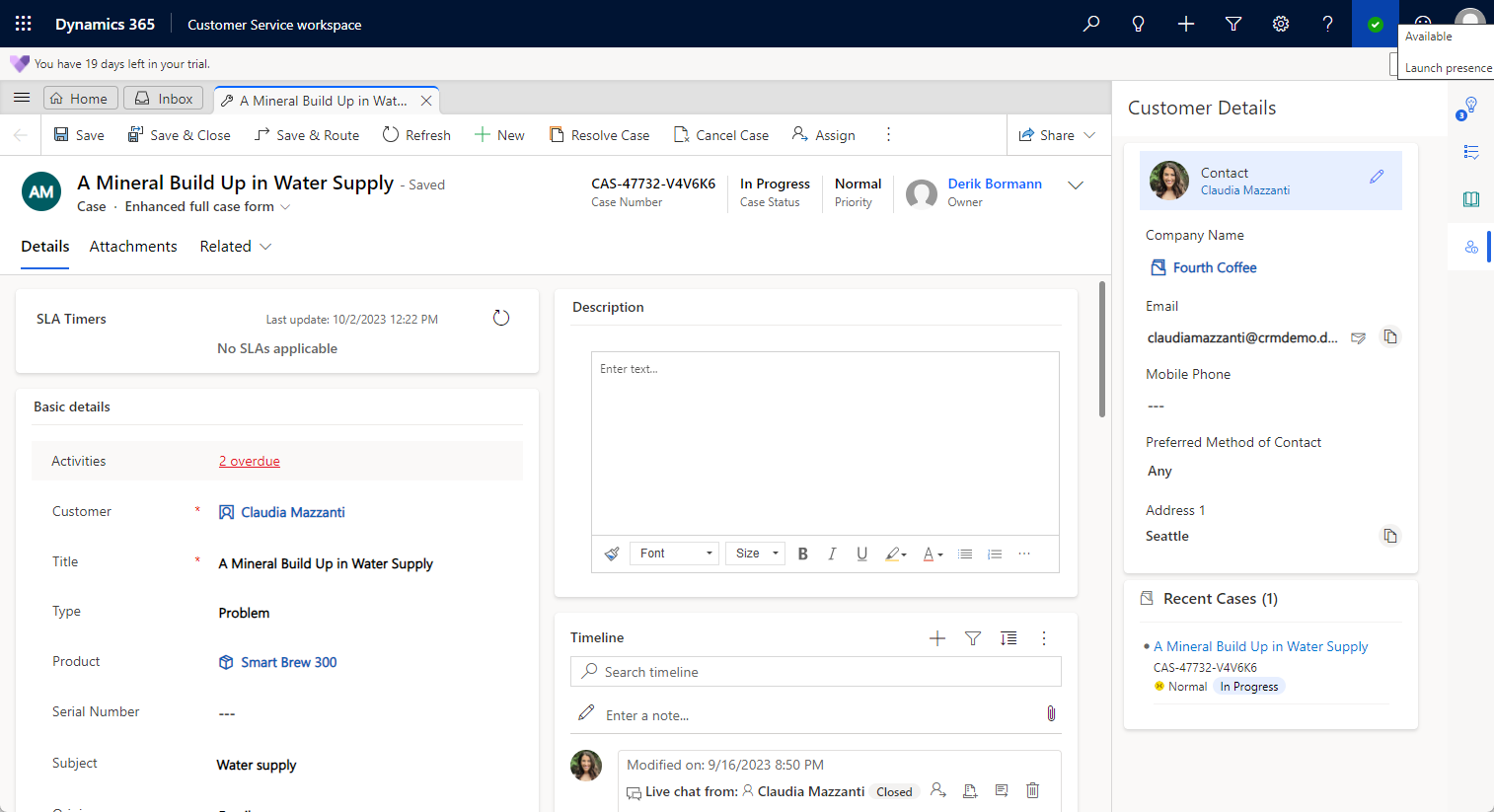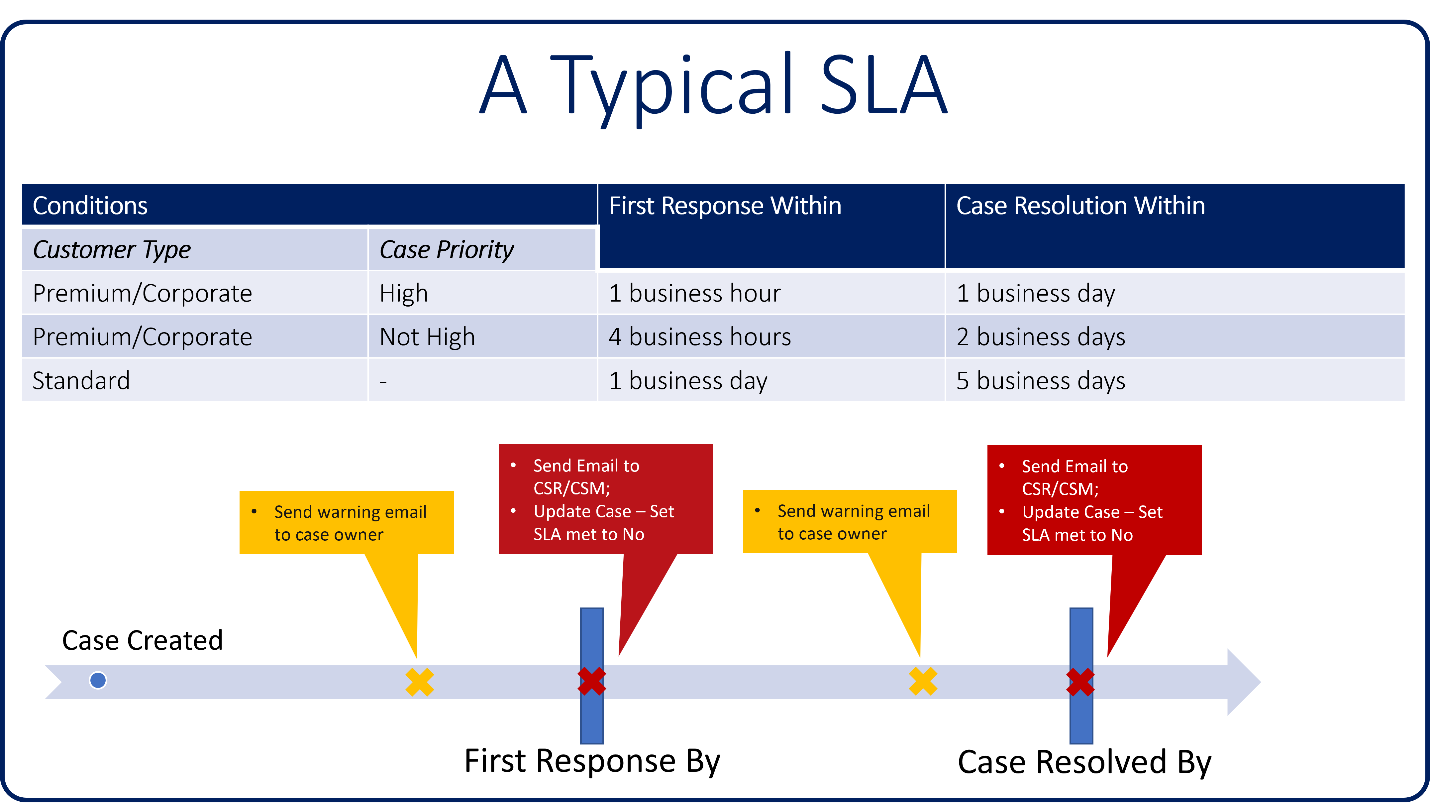Describe the case lifecycle including service-level agreements (SLAs) and entitlements
Dynamics 365 Customer Service makes it easier for you to work on and manage caseloads. It also provides you with the same user experience regardless of the platform you're using, such as a phone, tablet, or PC.
Case Lifecycle Management uses multiple features you can use to help manage and resolve the case records assigned to you.
Session management: Session tabs allow agents to work with multiple customers simultaneously. This feature allows agreements to increase their efficiency and switch between sessions as they're working with customers without losing conversation context or customer details.
Timeline: Displays related case activities. Time spent on case-related activities is recorded to determine how much time should be billed back to the customer.
- For example, if an agent placed three phone calls to a customer, each lasting 15 minutes, they might bill back 45 minutes to the customer.
Related: Provides quick access to search the knowledge base directly from the case record. Data from the case record is used to populate the search criteria.
- Once a knowledge article is identified, it can be emailed to the customer directly from the case and attached to the case record. This record can be helpful to agents in the future working on similar cases.
Smart Assist: AI backed bot that intelligently provides suggestions to agents as they assist customers with their issues. Out-of-the-box Dynamics 365 Customer Service includes two models, one for suggesting relevant knowledge articles, and another for suggesting similar cases.
Business Process Flows: By using automated business processes, you can define guided process flows to assist agents in resolving issues. By using features such as branching, your business process stages can dynamically change as data in the case changes. Business process flows ensure that agents are using the most appropriate business process based on the specific case they're working on.

Entitlements and SLAs
As a support organization, you want to ensure you're meeting the needs of your customers and fulfilling the promises that you made to them. One way that organizations meet their customers' support expectations is by providing support agreements to their customers. A support agreement typically entitles a customer to a specified amount of support over a specified period. For example, Contoso Coffee might have a customer who is entitled to 10 hours of phone support over a six-month period. Or Contoso Coffee might be able to open 15 cases related to a specific product.
Another way that organizations can measure success is through response and resolution times. Based on factors such as who is reporting the issue or the issue type, they might promise different timeframes related to the item.
For example, a customer who has a support agreement with your organizations might be promised a faster response time than someone who doesn't have a support contract. Dynamics 365 Customer Service helps organizations manage their service promises to customers through two mechanisms.
Service Level Agreements: Tracks and defines what should happen when a case is opened. SLAs determine the initial response time by a support engineer, or how long it takes to resolve the case.
Entitlements: Agreements that define the level and type of support to which a customer is entitled.
Service Level Agreements (SLA) help meet the desired service levels when providing support to customers. Dynamics 365 Customer Service SLAs allow you to track common Key Performance Indicators (KPI) such as first response and resolution time for every case that is submitted.
The image demonstrates what a typical SLA might look like for different types of customers based on their promised level of service.

Entitlements define specific support details that were promised to a customer. They include specified coverage dates and specified number of cases, or length of time. For example, a customer might be entitled to place 35 phone calls to a help desk team. Another customer is entitled to a total of 100 hours of technical support over multiple channels of communication.
Dynamics 365 Customer Service entitlements can help to support these types of instances, and can be used to manage and enforce various scenarios including:
Management of warranty contracts
Service specific contracts
Incident based support contracts
Time based support contracts